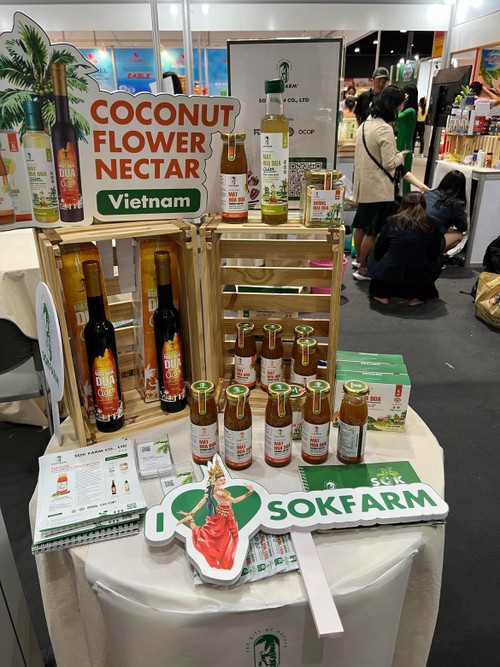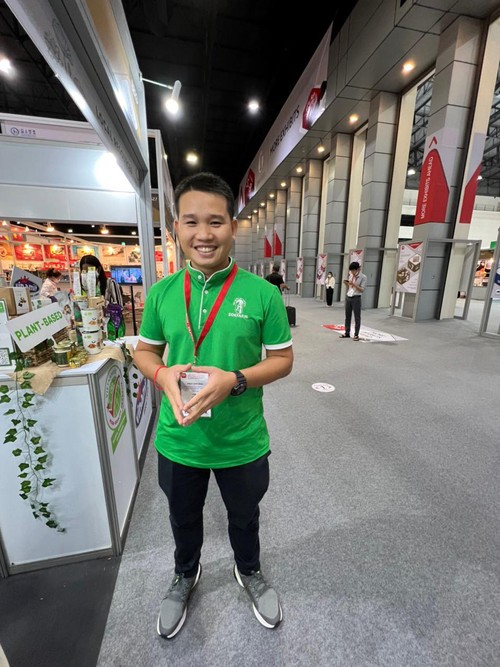 Sokfarm’s products on display at the Thaifex Anuga Asia 2022 (Photo: Ngoc Diep/VOV’s reporter in Bangkok) Sokfarm’s products on display at the Thaifex Anuga Asia 2022 (Photo: Ngoc Diep/VOV’s reporter in Bangkok)
|
In June 2019, after graduating with a Master's degree in food technology from Ho Chi Minh City University of Technology, Thach Thi Chal Thi of the Khmer ethnic group decided to establish the Sokfarm Company with her husband Pham Dinh Ngai and bring Sokfarm coconut nectar to the world.
Three years later, Sokfarm’s six products - coconut nectar, fresh coconut blossom water, coconut sugar, coconut flower vinegar, fermented coconut nectar, and cocoa nib and coconut nectar – are available in 30 provinces and cities nationwide. Last year Sokfarm began exporting to Japan and the Netherlands.
The idea of producing coconut flower-based products came in early 2018 when the price of dried coconut in Tra Vinh province dropped dramatically.
“Collecting coconut blossoms is a traditional profession of Khmer ethnic people in Trà Vinh. After choosing a coconut tree 3 to 10 years old, at least twice a day a worker must climb the tree to collect the coconut blossoms which are taken to a coconut nectar processing factory,” Mr. Ngai told VOV, adding “We’re using vacuum concentration technology to cook coconut blossoms. That means processing the product at a low temperature between 55 and 60 degrees Celcius for 10 hours to retain its nutrients, color, and taste.”
The technique used to collect coconut blossoms, called “massaging the coconut flowers, determines the amount of nectar obtained.
Thach Phuc of Tieu Can district, a worker of Sokfarm, said, “Massaging coconut flowers is meticulous work. Taking care of coconut flowers is like taking care of a baby, requiring much love so that they will produce more nectar and more income for you. Twice a day I climb the tree to get nectar. It takes about 25 days to collect all the nectar in a coconut flower.”
 Pham Dinh Ngai, co-founder of Sokfarm (Photo: Ngoc Diep/VOV’s reporter in Bangkok) Pham Dinh Ngai, co-founder of Sokfarm (Photo: Ngoc Diep/VOV’s reporter in Bangkok) |
At Sokfarm, raw materials are grown sustainably using practices that minimize impacts on the environment, said Mr. Ngai.
“We want to turn Sokfarm into a social impact business, because this is a traditional craft which Sokfarm hopes to preserve and develop more widely. It’s also a new direction for the development of coconut trees in the western provinces around Tra Vinh,” said Mr. Ngai.
He insisted, “The model of growing coconuts to collect coconut nectar increases the income of farm households 3 to 5 fold. And applying processing technology increases the value of our agricultural products and gives farmers an income that repays the effort they spend.”
Sokfarm has 30 workers, 80% of them Khmer and 70% of them female.
In 2013, FAO certified coconut nectar harvesting as a sustainable sector based on three factors: it can improve the lives of workers in vulnerable localities, such as the ethnic people in Tra Vinh; the production process is clean, and environment-friendly; and it matches current consumer trends.
“What Sokfarm is most concerned about now is expanding the production because we want to help the local farmers more. We’re preparing to construct a 1,000-square-meter workshop next year. We’re thinking about how to expand while still continuing to grow sustainably,” according to Mr. Ngai.
Sokfarm’s coconut nectar is an OCOP product of Tra Vinh province.
In the Khmer language, Sok means happiness. Sokfarm is happy agriculture, something Sokfarm’s founders want to achieve to increase profits and improve the lives of coconut farmers in Tra Vinh, and create a chain of products that bring health to consumers.